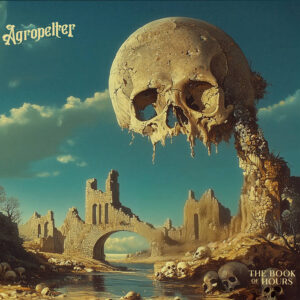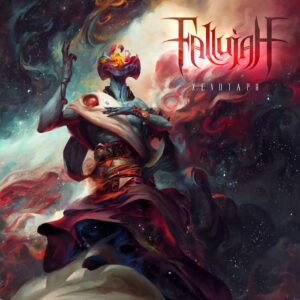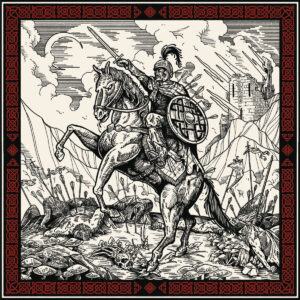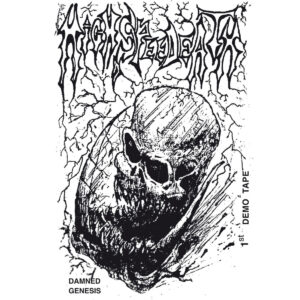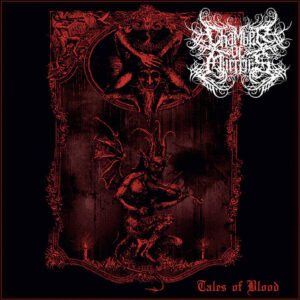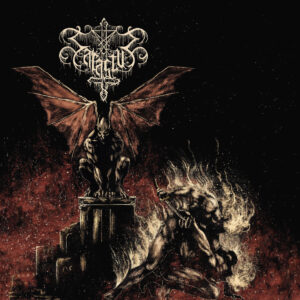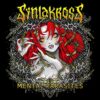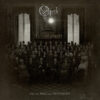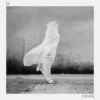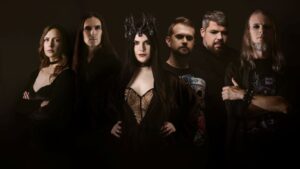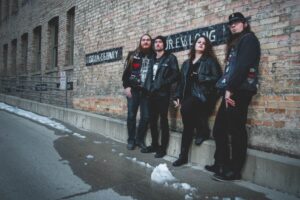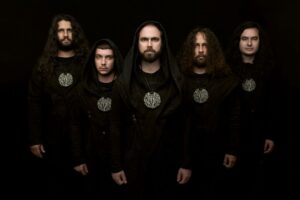Omnia Mors Aequat
Ulveblod
•
June 18, 2020
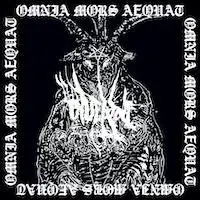
The Dutch black metal project, ULVEBLOD, comes forth with its first album entitled, "Omnia Mors Aequat" released earlier this year. The project is made by Vitrol who was the guitarist of the black metal band, NIHILL. Upon the vocalist's death, Vitrol decided to embark on a new project-one that combines the abstractness of NIHILL with even more dullness and intangibility. This new project is something that is out of the ordinary: experimental, noise, chaos, and dismal are words that come to mind when describing the creation. Although trying to search for beauty or a melody within the project's ideas, I am disheartened to say that I found none of the sorts. I believe with a project as so, one needs to keep in mind that this is perhaps a personal project for Vitrol and the wants of the listeners were not thought about. Nevertheless, it seemed to be something that was without feeling, and was just noise-one could even say numbness.
"Seven Heads And Ten Horns" sets the strange atmosphere that will reside throughout the album. Gusts of wind blow whirring sounds over the guitars and basslines so that it covers up what the instruments are trying to say. It is airy and distorted, and nothing fits into a place. The drums are echoed, and a voice screams through the abstractness. One would think that eventually, the mood would cease and the guitars would move towards a different rhythm. However, this main melody will never occur, and rather, guitars repeat the same few notes as to create a vision so much detached from a listener's ear, it harms than helps the project's ideology. There is a crackling, and one can begin to hear the riffs of the guitars wavering in and out of the noise. It breaches focus, but ends with the same irksome ambience it began with. "Purified By Fire" does not reach a stable state from the last, only sinks further down a dingy hole. Childlike drums begin the piece, and the guitars move up and down in space. These guitars sound off-key and do not fit the noise pattern. They follow a strange tune and this tune does not change, nor stop throughout the duration of the song. The only part that changes is the voice, whose words and screams are different than the noise in the backdrop. At some moments, the screams hurt one's ears as they were recorded at such a loud and high frequency. Likewise, this track never comes into focus. "In The Shadow Of Sephirah Keter" introduces more drums in echoed spaces. Guitars are heavier and somewhat duller in this track. Nevertheless, it is still noise. Noise that never comes to an understanding or a statement, but noise that stretches across a broad range of space, only to fade in the end. There are no beats to follow, no notes to hear, just incomprehensible noise that sounds like air blowing through a microphone or static left after an instrument. The double kick comes through as the guitars vanish into nothingness. The end of the track brings forth strange alien-like sounds that bring utter despair to the album's defeat. Although quite a bold statement, "Chaosophy" may be the only track that remotely contains some melody, some base to the album. It has a sound beat. Noises do flow over top of the track, but not as much as the previous. It resembles an old school punk attitude. But the guitars do not go much anywhere. They continue to stay on the same frequency. The voice of the screams tie the loose ends together, but do not fully finish the tie of course. Their final track, "The Dying Wound Of God" does not have any differences than what the album has already set up. Only this one song is a mere twenty minutes long, and for the majority of the track, it is made up of jarring and obscure noises. Drums beat constantly for some parts of the track. The whirring of the noises repeats a similar pattern as shown in the first track. A scream lingers in a nefarious environment. Open eyes reveal a chamber of mystique, with heavy clouds and cold walls. There is nothing to be heard but piercing sounds, and nothing to smell but foulness. Guitars are indistinguishable. They move slightly, but not enough to make out a sentence. With approximately six minutes left to the song, there is finally a breakdown-a shift in a noise monotony. It is wavering notes and ghastly sounds. But the notes stay the same, the style stays the same, and this time, there is nothing but noise; no guitar, no voice, just strange notes. The wind flows through these ideas again, before eventually the track fades.
ULVEBLOD's "Omnia Mors Aequat" is a piece that is rooted in a hopeless ambience. Rarely does the music surface to create a simple structure and feature the musician's true ideas and musical philosophy. Instead, the album creates a distorted vision of what the artist's intentions are, and allows the listener to be trapped in a dim scenery exploited by indecipherable creations. I cannot say whether this type of album works or does not work, and this is my critique which I will embellish upon. What I can say is that in order for a project to resonate, there needs to be something for the listeners to grasp. Out of the fog, I have felt that these dark and rapid spinning thoughts could be personal to the musician, but not as personal, nor memorable, to the listener. Thus, it satisfies a minute group of individuals with which it could work. I had wished for the project to have more senses to it, rather than chopping up those senses and scattering them like seeds. Those seeds could have made the piece blossom.
6 / 10
Had Potential
Songwriting
Musicianship
Memorability
Production

"Omnia Mors Aequat" Track-listing:
1. Seven Heads And Ten Horns
2. Purified By Fire
3. In the Shadow Of Sephirah Keter
4. Chaosophy
5. The Dying Wound Of God
Ulveblod Lineup:
Vitrol - Guitarist
More results...
